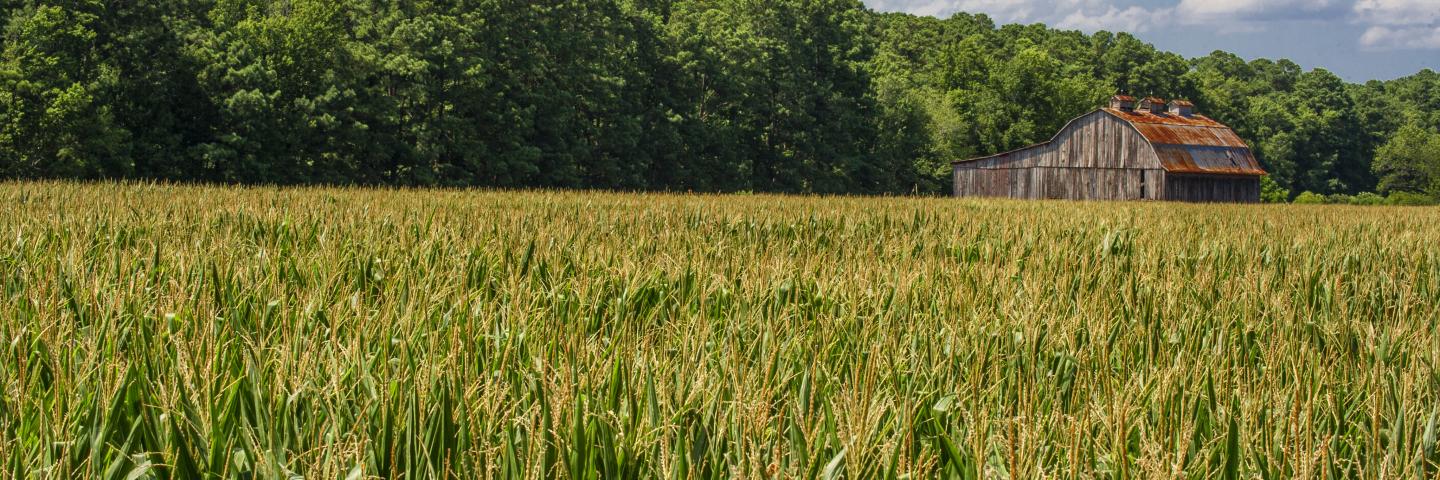
The Regional Conservation Partnership Program (RCPP) is a partner-driven approach to conservation that funds solutions to natural resource challenges on agricultural land.
State Program Overview
NRCS has been bolstering locally led conservation and expanding partnerships through the RCPP since its inception in 2014. Maryland currently offers 10 RCPP projects that leverage partner funds to support out-of-the box solutions to today’s conservation concerns.
State Priorities
Maryland's resource priorities are:
- Water Quality
- Soil Health
- Wetland Restoration and Easements
- Land Easements
- Habitat for Threatened and Endangered Species
- Air Quality
Current Projects
Achieving WIP Goals and Nutrient Management in Maryland- This is a Critical Conservation Area (CCA) RCPP project to promote a cost effective and nutrient effective solution to address manure management and related resource concerns in the Chesapeake Bay watershed. The overall project success will be based on reducing the best management practice (BMP) gap for the Watershed Implementation Plan (WIP) and increasing NM regulation compliance in northern Maryland. Producers in Allegany, Baltimore, Cecil, Carroll, Frederick, Garrett, Harford, and Washington counties who are interested in Waste Storage Facilities, Watering Facilities, and Fencing are encouraged to visit their local USDA Service Center to apply.
Grazing for Water Quality & Soil Health- In partnership with the Chesapeake Bay Foundation, this multi-state RCPP project seeks to increase the adoption of complementary practices like livestock stream exclusion, off-stream watering, and forested buffers in the northern tier counties in Maryland to reduce nutrients and sediment runoff and help with the Chesapeake Bay clean-up. Producers with active contracts located in Baltimore, Carroll, Frederick, Howard, Montgomery, and Washington counties interested in pasture intensive Prescribed Grazing, Forage and Biomass Planting, Watering Facilities, and Fencing are encouraged to visit their local USDA Service Center for contract updates.
Million Acre Challenge- This project helps farmers throughout Maryland to build soil health, increase farm profitability, and improve water quality while making their farms resilient in the face of climate change. The goal is to have one million agricultural acres in Maryland using healthy soil techniques throughout the Chesapeake Bay region by 2030. Maryland producers who are interested in grazing and soil health focused practices such as Conservation Crop Rotation, Prescribed Grazing, and Pest Management Conservation System are encouraged to visit their local USDA Service Center to apply
Engaging Small Animal Feeding Operations (AFOs) in the Nutrient Management Planning Process- This project seeks to reduce nutrient and sediment loss associated with small dairy AFOs by encouraging the development and implementation of Comprehensive Nutrient Management Plans. It is available to small dairy operations interested in developing comprehensive nutrient management plans and implementing plan practices, including waste storage structures, animal mortality facilities, heavy use areas, barnyard runoff practices, animal exclusion practices, and enhanced nutrient management (such as manure injection), among others. It is available to producers in Carroll, Frederick, and Washington counties.
Connecting Small and Urban Farms in the Baltimore and Washington D.C. Urban Corridor with Conservation Resources- This project connects urban farmers with NRCS and partner conservation resources. It seeks to increase the number of historically underserved farmers that benefit from conservation and partner infrastructure program funding. All conservation practices are available to benefit the urban farmers or small farmers on this project. Producers in Baltimore, Howard, Montgomery, Washington DC, Prince George’s and Anne Arundel counties, and producers outside these areas who are interested in urban or small-scale farming are encouraged to visit their local USDA Service Center to apply.
Mid-Atlantic Dairy Farmers Producing Tangible Results Through Climate Smart Solutions-The goal of this project is to increase outreach and education about conservation practices and their benefits to dairy farmers in Maryland, North Carolina, Pennsylvania, and Virginia. It estimates the environmental impact of farm production by projecting air quality impact and energy usage along with feedstock. Producers in Washington, Frederick, Carroll, Baltimore, Harford, Cecil, Queen Anne’s, Talbot, Montgomery and Prince George’s counties who are interested in water quality and/or climate smart conservation practices climate smart are encouraged to visit their local USDA Service Center to apply.
ESLC Land Protection Initiative- In partnership with The Eastern Shore Land Conservancy (ESLC), this project seeks to increase land protection in the Delmarva region through conservation easements. The primary easement purposes for this project include both working lands preservation and habitat preservation or creation to enhance the Chesapeake Bay watershed. For water quality, all easements will require 100 foot naturally vegetated buffers along all tidal waterways, with project selection preference going to properties along the Sassafras River and the Chesapeake Bay. Producers in Kent and Cecil counties are encouraged to contact their local USDA Service Center to apply.
How to Apply
Partners - NRCS will release an announcement for program funding, that will outline requirements for proposal submissions for funding. NRCS will review partnership proposals according to the priorities identified in the announcement and make project selections. Upon selection of a partnership proposal, NRCS and the partner will enter into a partnership agreement through which they will coordinate to provide producers in the project area assistance. Partnership agreements may be for a period of up to five years. NRCS may extend an agreement one time for an additional 12 months if needed to meet the objectives of the program.
Producers – NRCS will have several opportunities for producers to apply for existing RCPP project funds throughout the year. The next fiscal year 2025 application cutoff date is April 25, 2025. Additional cut-off dates may be added based on funding availability. Contact your local Service Center to learn more.
Program Contacts
Bianca Soto
RCPP Coordinator
Phone: (302) 245-7659
Email: bianca.soto@usda.gov
Ready to get started?
Contact your local service center to start your application.

